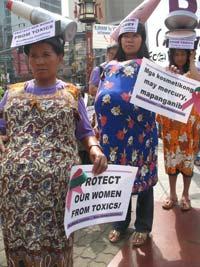Alarming increase among Asians seeking fair skin

Illegal injections of a cancer-treating chemical pose a risk of death to legions of Filipinos around the world who use them to try to whiten their skin, health authorities have warned.
The Food and Drug Administration (FDA) in Manila suspects the drug glutathione is being injected in high doses as a skin-whitener, but said it can cause serious conditions including kidney failure and blood poisoning.
Glutathione, which is used for cancer treatment, may cause death to those who use them in high doses to try to whiten their skin, the FDA said.
Also regarded as a potent anti-oxidant, one of its side effects, however, is that it whitens the skin by deactivating the enzyme tyrosinase, which helps produce melanin. Melanin, on the other hand, is the pigment that gives human skin its color.
The agency said injecting glutathione in high doses can cause serious conditions like blood poisoning and kidney failure, among others.
In a statement, FDA spokesperson Jesusa Joyce Cirunay said their agency has issued advice against taking regular injections of the “cancer treatment chemical” allegedly being endorsed by some dermatologists.
Although she gave no exact figures, she said the agency had monitored many cases of glutathione use resulting in ailments.
She said repeated injections of the drug could lead to blood poisoning, kidney failure, and some form of toxic epidermal necrolysis, in which a large portion of the skin peels off, exposing the human body to many infections.
“The alarming increase in the unapproved use of glutathione administered intravenously as a skin-whitening agent at very high doses is unsafe and may result in serious consequences to the health of users,” she said.
Skin-whitening treatments and products including soaps, lotions and deodorants are popular in the Philippines and other Asian countries.
They have names like Fasco Herbal Cream and FC Lemon Herbal Whitening Cream. And they’re widely sold in overseas immigrant communities.
In the U.S. last month, Minnesota health officials said they detected dangerous and illegal levels of mercury in almost a dozen types of skin-lightening products. They warned consumers to avoid all skin-lightening products unless they can be sure they’re mercury-free.
Some of the samples tested by the state Health Department contained more than 33,000 times the permissible level of mercury, so much that they urged consumers to treat the products as hazardous waste.
In Canada, several websites, many promoting Filipino products were also offering skin whitening creams and lotions.
how many days to ship the skin whitening product to Canada? asked Elen of Edmonton or one such website which garners a response: Hi Elen, shipping to Canada can take 6-10 days for “non-US shipping”, or 3-5 days for “Express non-US shipping”. Order now. :)…signed Maria
The vast selections of skin-whitening creams on supermarket and pharmacy shelves in Asia are testament to an industry that has flourished over the past decade, with 4 out of 10 women in Hong Kong, Malaysia, the Philippines, South Korea and Taiwan now using a skin-whitening cream, a survey conducted by Synovate, a market research company, found.
The skin-whitening craze, which runs parallel to the global trend of cosmetic surgery and botox injections, is not just for the face. It includes creams that whiten darker patches of skin in armpits and “pink nipple” lotions that bleach away brown-colored pigment.
And while many if not most skin-whitening creams are safe, doctors, consumer groups and government officials are reporting dangerous consequences of the white-is- beautiful trend: Instead of treating blemishes, women are applying potent creams in large and harmful doses.
Inexpensive black-market products with powerful but illegal bleaching agents are also selling briskly throughout the poorer parts of south and Southeast Asia.
Thailand’s Food and Drug Administration has published a list of 70 skin- whitening creams circulating illegally around the country. Indonesian officials have identified more than 50 banned cosmetics.
But there are also questions about legitimate creams. Some doctors say that hydroquinone, prescribed for years by dermatologists around the world to remove blemishes, may be cancerous, especially if used over an extended period of time in large doses.
Hydroquinone, which is also used in photo processing materials, has been shown to cause leukemia in mice and other animals. The European Union banned the ingredient from cosmetics in 2001 but it remains widely available in prescription drugs or in bootleg creams in many parts of the developing world.
Sociologists have long debated why Asians, who are divided by everything from language to religion to ethnicity, share a deeply held cultural belief that lighter skin is more attractive.
One commonly repeated rationale is that a lighter complexion is associated with wealth and higher education levels because those from lower social classes, laborers and farmers, are exposed to the sun and thus have darker complexions.
Another theory is linked to the waves of lighter-skinned conquerors, the Moguls from Central Asia or the colonizers from Europe, whose complexions became the standard for attractiveness.









